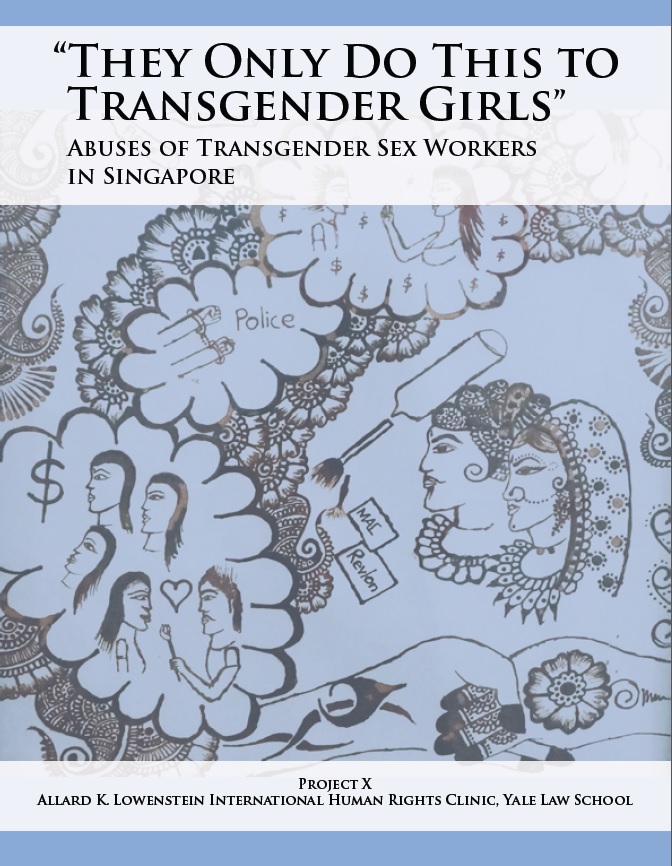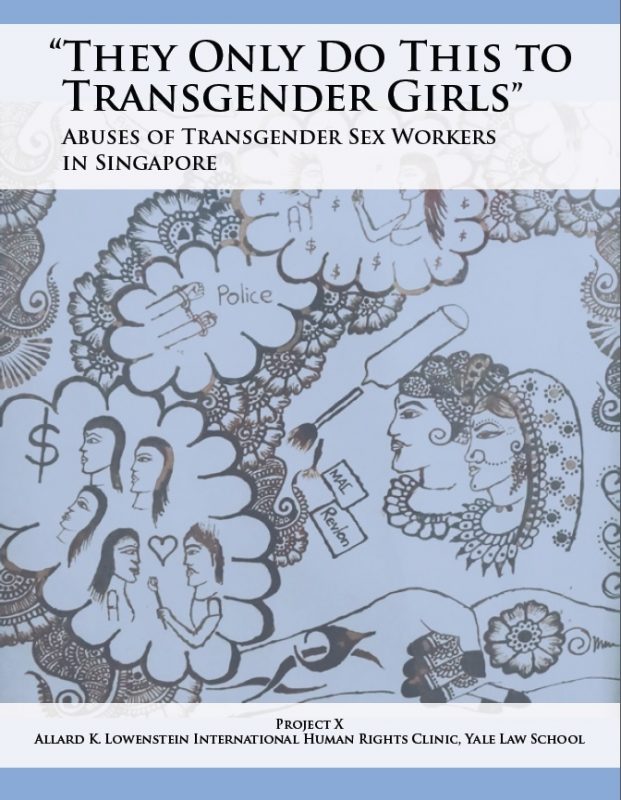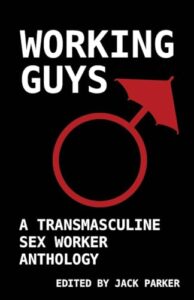Late 2013, we approached by the Allard K. Lowenstein International Human Rights Clinic, Yale Law School, upon being recommended by a local professor. They wanted to reach out to groups working on LGBT issues with the hope of producing a full human rights report. We exchanged a few long distance emails, and finally agreed upon an area that we wish to look at. Fast forward to March 2014, the team flew to Singapore with a plan and a proposal and started working. Twenty six full length interviews, twenty six transcriptions, and a process of writing and re-writing, the law students have completed the full report.
It details abuses that dates back a decade to recent incidences. It analyses legislation and policies and the impact it has on the trans sex worker community in Singapore. The tireless and passionate members of the Human Rights Clinic have managed to uncover some more untold and unknown stories of, about, and in Singapore.
Download the full report here: They-Only-Do-This-to-Transgender-Girls-Singapore-Report-Final.pdf and view the “Summary” as follows.

—–
“More than ten times, police have stopped me and taken photos. They probably go back to the station and laugh about it. They only do this to transgender girls.”
—Transgender sex worker, March 19, 2014
“The first time they [the police] had a bamboo stick. They threatened me, pulled my hair, telling me, ‘How much is the price? Tell us the price.’ Of course, with a bamboo stick, pulling my hair, I had to tell them the price.”
—Transgender sex worker, March 19, 2014
“They [the police] tried to search me because of condoms in my bag. I said I have them for my own safety and I need these for my boyfriend so I have to use them. . . . They said evidence is in your bag. I didn’t want them to charge me. . . . I’m sometimes worried. If there is an operation I just throw them away.”
—Transgender sex worker, March 20, 2014
Transgender persons in Singapore are an acutely vulnerable population. They encounter strong pressures to conform to societal norms and can receive little support from their families. They are isolated within the school system, and confront discrimination in the job market. With few other opportunities, many transgender women enter the sex trade. From the pubs and cafes of Geylang to the Orchard Towers shopping complex to the Changi Village and Woodlands parking lots to online message boards, a significant number of sex workers are transgender women. And while the government has chosen to authorize the licensing of certain brothels, it categorically bans pre-operative or non-operative transgender women from this system, therefore subjecting them to the full brunt of the criminal law. This ban has greatly exacerbated the myriad challenges that transgender individuals who engage in sex work face.
This report details abuses faced by transgender sex workers in Singapore and provides recommendations on how the Singaporean government can address such violations. In order to gather this information, a team of students from the Lowenstein International Human Rights Clinic at Yale Law School interviewed twenty-six transgender sex workers in March 2014, as well as twelve individuals with expertise in sex work issues, including lesbian, gay, bisexual, and transgender (LGBT) activists, scholars, NGOs, and workers at health clinics.
Criminalization produces lasting difficulties in the realms of healthcare, employment, safety, and financial security, depriving transgender sex workers of the protections afforded by licensed brothels. Moreover, they are often subject to abuse by the police, such as cursing or taunting, excessive force during arrests, and in at least one documented case, rape. As a persistently marginalized population deemed to be criminals under the law, these women have no recourse to protect themselves against, or seek redress for, such incidents. Criminalization thus facilitates police mistreatment of vulnerable communities, a problem that has reached new heights with the influx of migrant transgender sex workers.
The abuses described in this report violate a number of human rights, which sex workers—like all other persons—are guaranteed under domestic and international law; in particular, state actions contravene the rights to liberty and security of the person, health, education, work, non-discrimination, and human dignity. These rights are widely recognized under international law, and enshrined in multiple international instruments. Singapore’s constitution likewise safeguards fundamental rights that are routinely denied to transgender sex workers.
In addition to breaching both international and domestic norms, state targeting of the transgender community runs contrary to the inclusive principles that define Singapore. With significant Malay, Chinese, and Indian populations, Singapore prides itself on diversity. This spirit has recently extended to certain long-marginalized groups, such as the country’s gay and disabled populations. In contrast, current laws push transgender sex workers further and further towards the periphery.
To ensure sex workers fully enjoy their human rights, the Ministry of Health, the Ministry of Education, the Ministry of Home Affairs, and various branches of the Singapore Police Force—the entities most directly involved with sex work issues—should develop reforms that best enable transgender sex workers to meaningfully participate in Singaporean society.
Most importantly, Singapore should decriminalize sex work. Decriminalization would remove all current laws that criminalize sex work; instead, the same laws applicable to other forms of employment would govern. By lifting prohibitions on activities such as solicitation, living off the avails of prostitution, or operating a brothel, the state would eliminate key tools that facilitate abuses against sex workers and discourage them from seeking redress.
Decriminalization should be paired with other escorts to reduce transphobia and expand the options available to trans women. By prohibiting discrimination on the basis of gender identity and maximizing the accessibility of education, employment, health care, and housing, the government of Singapore can ensure trans women who do not wish to engage in sex work have viable alternatives available to them. Together, these policy changes would achieve several objectives referenced above: better compliance with domestic law and human rights instruments; improved health, economic, and security outcomes; and realization of the inclusive ideals to which Singapore aspires.
Singapore currently informally tolerates cisgender sex workers and grants “yellow cards” to post-operative transgender and migrant sex worker applicants. The government should immediately act to allow pre- or non-operative transgender sex workers equal access to the yellow card system. Furthermore, in order to address the problematic ambiguity and pseudo legality of the current system, Singapore should publicly clarify how it regulates brothels.
Providing clear guidelines can help lessen arbitrary abuses and ensure that sex workers are able to seek redress. In combination with a longer process of decriminalization, such interim reforms will help remedy the abuses detailed in this report.
—






